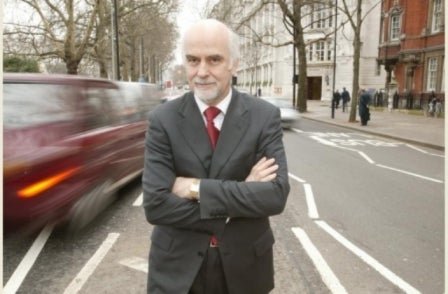
-
Leveson 'regrets' taking on inquiry, claims Kavanagh
-
Newspaper editors 'have gone mute'
-
'We do not need to be licensed like dogs and gun owners'
-
But a 'more robust version of the PCC' is needed, Kavanagh says
The Sun’s associate editor Trevor Kavanagh has urged Lord Justice Leveson to do “as little as possible” – claiming journalists “do not need to be licensed like dogs and gun owners”.
Leveson is expected to release his report on the practice, culture and ethics of the British press next month, and has promised that his recommendations will not end up as a “footnote in some professor of journalism's analysis of 21 century history”.
Today, Kavanagh made his third public attack on the inquiry, having claimed that Leveson was "out to get the tabloids" in October, and suggesting that journalists were being treated like "members of an organised crime gang" five months later.
In his latest broadside, which appeared on the Index on Censorship website, Kavanagh claimed that Leveson is “said by those who know him to regret taking on David Cameron’s ill-conceived inquiry into press ethics”, adding: “But not as much as the newspaper industry into whose inner workings he is delving with such shock and horror.”
He claimed the inquiry had “invited anyone with a grievance to vent their spleen” and that is has the potential to “curb free speech, shackle a free press and inhibit the right to examine the conduct of those who rule over us”.
“The inquiry was, it must be said, entitled to examine unacceptable and sometimes illegal practices by some journalists on most newspapers,” he said.
“Yet no apology (of which there have been many), no level of compensation (many millions) and no retribution (dawn police raids, criminal charges and the NoW closure itself) is enough to assuage the indignation of those for whom this investigation has been poetic justice.”
He added: “His lordship does not like tabloids even if millions do. His inquiry has sometimes strayed into the realm of political correctness — Page Three girls, the coverage of Islamism and even jokes about speech impediments.
“Even as I write this, I wonder if he might haul me in to explain myself. That is the effect of the Leveson Inquiry. Newspaper editors who might normally rage about free speech have gone mute, perhaps to avoid retribution.”
Kavanagh suggested that it had been left to Michael Gove to defend the British press, in reference to comments made by the Education Secretary earlier this year.
Gove, a former journalist at the News Corporation-owned Times, told a Parliamentary Press Gallery lunch in February that he saw "dangers" in the inquiry and that it had created a “chilling effect”.
A report in by the Mail on Sunday in June claimed Leveson had threatened to quit after complaining to the Government about Gove’s comments.
‘Something’ must be done
Kavanagh commented: “Lord Leveson insists he has no hidden agenda’, did not try to gag Gove and believes the press is entitled to say what it likes.
“But he believes the story was published at his expense to defend Fleet Street’s interests. The fact that it was in the PUBLIC interest seems to have passed him by.”
He continued: “So what should Lord Leveson do? Preferably as little as possible. We do not need to be licensed like dogs and gun owners. Nor a professional body like the General Medical Council or the Law Society, neither of which have covered themselves in glory. Prior disclosure is the kiss of death for important stories.
"But ‘something’ must be done. So what about a beefed-up complaints procedure, a new, more robust version of the PCC with an ombudsman offering free conciliation?
“It could compel a newspaper to print an apology, retraction or correction in extreme cases on Page One. But we should think twice about cash awards which would expose all newspapers, national and local, to the no-win, no-fee vultures.
“In America, under the First Amendment, citizens are free to say what they like, even if it offends — except shouting 'fire' in a crowded theatre. In Europe, privacy laws allow the rich and powerful to conceal corruption — and they are spreading here like noxious weeds.
“Judging by Lord Justice Leveson’s response to his own experience of an investigative press, he leans towards the European system. If so, it won¹t be his legacy that is consigned to a footnote. It will be the hard-won, centuries-old and almost irreplaceable tradition of a truly free press.”
Email pged@pressgazette.co.uk to point out mistakes, provide story tips or send in a letter for publication on our "Letters Page" blog
